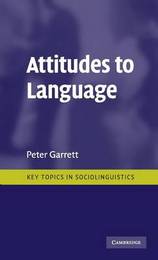
|
Attitudes to Language
Hardback
Main Details
| Title |
Attitudes to Language
|
| Authors and Contributors |
By (author) Peter Garrett
|
| Series | Key Topics in Sociolinguistics |
|---|
| Physical Properties |
| Format:Hardback | | Pages:268 | | Dimensions(mm): Height 216,Width 16 |
|
| Category/Genre | Sociolinguistics |
|---|
| ISBN/Barcode |
9780521766043
|
| Classifications | Dewey:306.44 |
|---|
| Audience | | Professional & Vocational | |
|---|
| Illustrations |
10 Tables, unspecified; 1 Halftones, unspecified; 20 Line drawings, unspecified
|
|
Publishing Details |
| Publisher |
Cambridge University Press
|
| Imprint |
Cambridge University Press
|
| Publication Date |
8 April 2010 |
| Publication Country |
United Kingdom
|
Description
Just about everyone seems to have views about language. Language attitudes and language ideologies permeate our daily lives. Our competence, intelligence, friendliness, trustworthiness, social status, group memberships, and so on, are often judged from the way we communicate. Even the speed at which we speak can evoke reactions. And we often try to anticipate such judgements as we communicate. In this lively introduction, Peter Garrett draws upon research carried out over recent decades in order to discuss such attitudes and the implications they have for our use of language, for social advantage or discrimination, and for social identity. Using a range of examples that includes punctuation, words, grammar, pronunciation, accents, dialects and languages, this book explores the intricate and fascinating ways in which language influences our everyday thoughts, feelings and behaviour.
Author Biography
Peter Garrett is Professor of Language and Communication at the Cardiff University Centre for Language and Communication Research. His recent publications include Investigating Language Attitudes: Social Meanings of Dialect, Ethnicity and Performance (with Coupland and Williams, 2003).
Reviews'... essential reading for all those concerned with the 'social life of language'.' John Edwards, St Francis Xavier University '... likely to be the standard text for students in the field for many years to come.' Tore Kristiansen, Copenhagen University
|